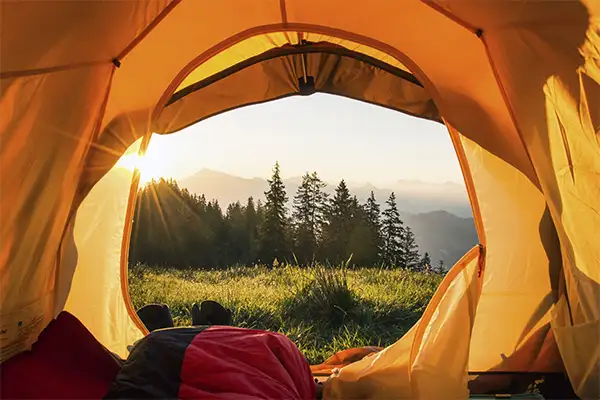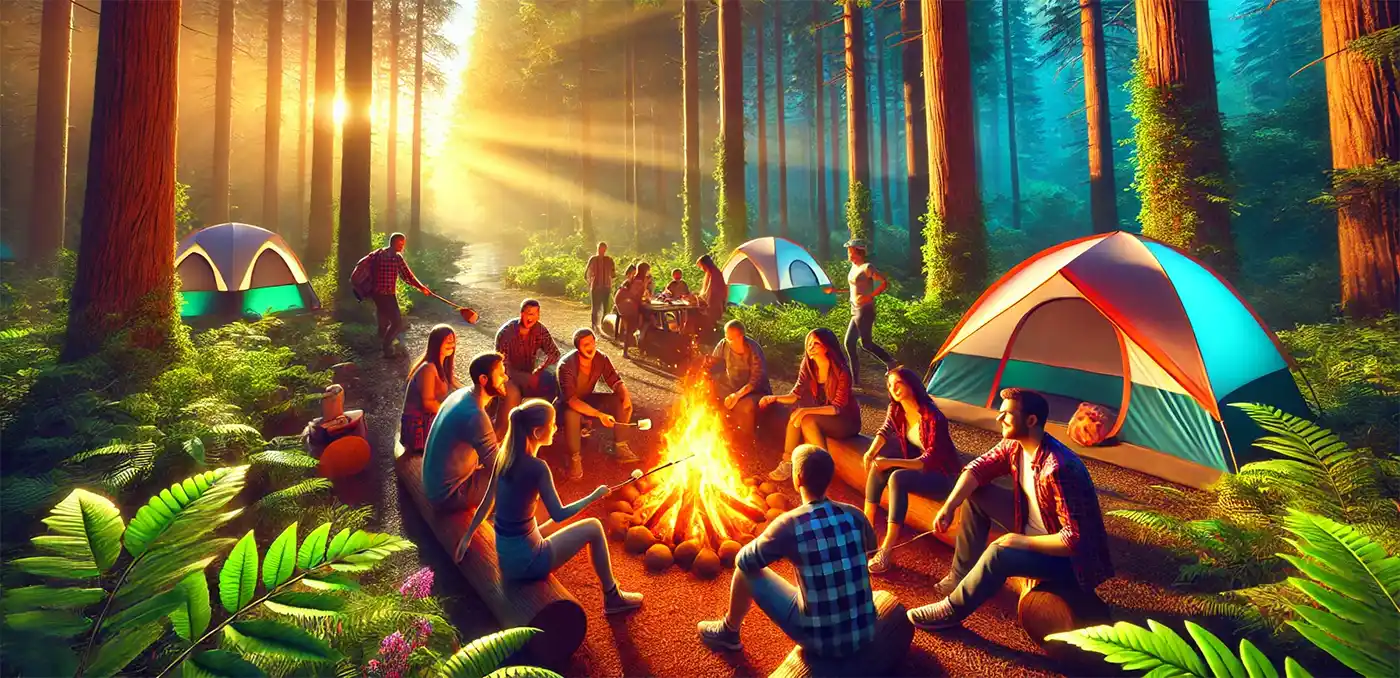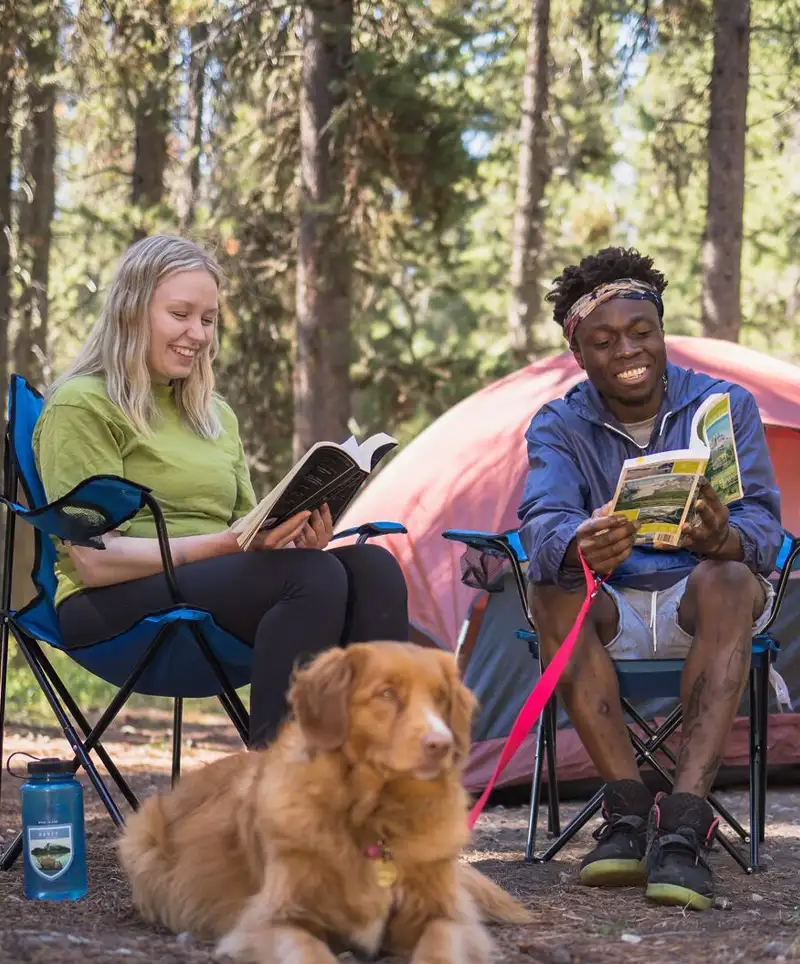National Camp Day, celebrated annually on November 19, is a special occasion dedicated to honoring the enriching experience of camping in various forms, from adventurous wilderness outings to structured summer camps for youth. This day underscores the multifaceted benefits of camping, including its ability to connect individuals with the natural world, encourage self-reliance, and cultivate a sense of community among participants. Whether it involves pitching a tent under the stars, engaging in outdoor recreational activities, or participating in group learning and development programs at summer camps, National Camp Day is a tribute to the enduring appeal and educational value of these experiences. It brings together camping enthusiasts and novices alike, offering an opportunity to explore the outdoors, learn new skills, and create unforgettable memories. This celebration not only highlights the personal growth and enjoyment derived from camping but also emphasizes the importance of preserving natural environments and promoting sustainable outdoor practices.
History and Significance
The origins of National Camp Day can be traced back to the early 20th century when organized camping began to gain popularity in the United States and other parts of the world. The concept was initially developed as a way to provide children and adults with an escape from urban environments, offering a chance to connect with nature and learn valuable life skills.
 Over the years, the idea of camping has evolved to include various forms, ranging from traditional wilderness camping to educational summer camps for children and teens. The day emphasizes the value of these experiences in promoting physical health, mental well-being, and social skills.
Over the years, the idea of camping has evolved to include various forms, ranging from traditional wilderness camping to educational summer camps for children and teens. The day emphasizes the value of these experiences in promoting physical health, mental well-being, and social skills.
Types of Camping Celebrated
- Traditional Camping: Involves setting up tents in a natural environment, often in designated campgrounds or remote wilderness areas. It’s a way to experience nature directly, with activities like hiking, fishing, and campfire cooking.
- Summer Camps: These are structured programs for children and teenagers, offering a range of activities from sports to arts and educational pursuits. They are instrumental in fostering independence, teamwork, and new skills in a safe and supervised environment.
- RV and Glamping: For those who prefer a less rugged experience, RV camping and glamping (glamorous camping) provide the comforts of home in scenic settings. These options have broadened the appeal of camping to a wider audience.
Environmental and Educational Impact
National Camp Day plays a crucial role in emphasizing the environmental education component of camping experiences. This aspect of camping is integral, as it offers a unique platform for participants, especially young campers, to learn about and engage with environmental stewardship and sustainability practices.
- Conservation Education: Camps often incorporate lessons on conserving natural resources, understanding ecosystems, and the importance of biodiversity. This education is not just theoretical; campers are encouraged to practice conservation by minimizing waste, using resources responsibly, and understanding their impact on the environment.
- Wildlife Protection Awareness: One of the key elements of National Camp Day is fostering a respect and understanding for wildlife. Campers learn about local flora and fauna, the importance of habitats, and the roles various species play in the ecosystem. This awareness is critical in promoting a coexisting relationship between humans and wildlife.
- Sustainable Living Practices: Many camping programs integrate sustainable living skills into their activities. This includes teaching campers about renewable energy, sustainable food practices, and low-impact camping techniques. The aim is to instill a mindset of living in harmony with nature, which participants can carry into their everyday lives.
- Hands-On Experiences: Environmental education in camping settings often involves hands-on activities like planting trees, participating in recycling and composting, and learning to use natural resources judiciously. These practical experiences help solidify the concepts being taught and make learning fun and engaging.
- Nature-Based Learning: Camps utilize the natural surroundings as a living classroom, where campers can directly observe and interact with the elements they are learning about. This immersive experience deepens their understanding and appreciation of the natural world.
- Eco-Friendly Camp Practices: Camps celebrating National Camp Day often lead by example in implementing eco-friendly practices. This includes using solar power, providing organic and locally sourced food, and ensuring that their operations have minimal environmental impact.
- Fostering Future Environmental Stewards: By engaging campers in environmental education and sustainable practices, National Camp Day plays a pivotal role in nurturing the next generation of environmental stewards. It instills a deep-seated appreciation and respect for the natural world, motivating individuals to advocate for and protect our planet.
National Camp Day is not just a celebration of camping but also an essential conduit for imparting environmental education. By blending fun, learning, and hands-on experiences, it provides a comprehensive approach to understanding and practicing environmental conservation, wildlife protection, and sustainable living.
Social and Health Benefits
The social and health benefits of camping, as celebrated on National Camp Day, are extensive and impactful. This activity goes beyond just enjoying the outdoors; it offers profound advantages for both physical and mental well-being, as well as fostering valuable social skills.
Health Benefits
- Stress Reduction: Immersion in nature has a proven calming effect, helping to reduce stress and anxiety levels. The tranquility and peace found in natural settings allow for mental decompression, away from the hustle and bustle of daily life.
- Improved Physical Fitness: Camping activities often involve physical exertion like hiking, swimming, canoeing, or cycling, which contribute to overall physical fitness. These activities increase cardiovascular health, muscle strength, and flexibility.
- Enhanced Mental Health: The natural environment is a therapeutic setting that can improve mood and mental clarity. Activities like bird watching, nature walks, or simply sitting by a campfire can significantly boost mental health and emotional well-being.
- Exposure to Sunlight: Camping increases exposure to natural sunlight, which is crucial for Vitamin D synthesis in the body. Vitamin D is essential for bone health and has been linked to improved mood and immune function.
Social Benefits
- Developing Communication Skills: Camping often involves group activities that require communication and cooperation. These interactions are excellent for honing verbal and non-verbal communication skills in both children and adults.
- Building Friendships: The communal nature of camping, especially in organized camps, provides a fertile ground for forming new friendships and strengthening existing ones. Shared experiences in a relaxed environment encourage social bonding.
- Learning Teamwork: Many camping activities require collaboration and teamwork. Participants learn to work together, problem-solve, and support each other, which are valuable skills in both personal and professional contexts.
- Cultural Exchange and Diversity: Camps, especially those with a mix of attendees from different backgrounds, offer a rich opportunity for cultural exchange. Campers learn about different perspectives and lifestyles, promoting inclusiveness and understanding.
- Leadership Skills: For older children and teenagers, camping provides opportunities to take on leadership roles, whether in organizing activities or guiding younger campers. This experience is invaluable in developing confidence and leadership abilities.
- Family Bonding: When families camp together, they share unique experiences that differ from their routine life. This can strengthen family bonds and create lasting memories.
The social and health benefits of camping celebrated on National Camp Day are holistic, touching upon physical, mental, and emotional wellness. They also extend to developing crucial life skills like communication, teamwork, and leadership. These benefits underline the importance of camping as an activity that not only provides enjoyment and relaxation but also contributes significantly to personal growth and well-being.

Celebrating National Camp Day
People celebrate this day in various ways:
- Outdoor Adventures: Many take this day as an opportunity to go camping, either solo or with family and friends.
- Community Events: Local communities and camping organizations often host events, workshops, and educational programs to promote camping.
- Sharing Experiences: Social media and community platforms buzz with stories, photos, and tips about camping experiences.
Future of Camping
The future of camping, as reflected in the observance of National Camp Day, is increasingly focused on sustainability and environmental stewardship. This shift is vital to ensure that the natural beauty and integrity of camping environments are preserved for future generations. Here's an elaboration on how National Camp Day is shaping the future of camping:
Emphasis on Sustainable Camping Practices
- Low-Impact Camping: Future camping trends emphasize the importance of leaving minimal environmental footprints. This includes practices like 'Leave No Trace' camping, where campers are encouraged to leave natural areas as they found them, or even better.
- Eco-Friendly Gear: There is a growing market for sustainable camping gear, including tents made from recycled materials, solar-powered equipment, and biodegradable products. This shift towards eco-friendly gear reduces the environmental impact of camping.
- Renewable Energy Use: Utilizing renewable energy sources such as solar panels for camping activities and campsite operations is becoming more prevalent. This transition aids in reducing reliance on fossil fuels and minimizes carbon emissions.
Technological Advancements in Camping
- Digital Integration: The future of camping may see more integration of technology, such as GPS for trail navigation, apps for identifying flora and fauna, and advanced weather forecasting tools to improve the safety and convenience of camping.
- Smart Campsites: The concept of smart campsites, equipped with advanced facilities like sensor-based lighting or energy-efficient systems, is on the rise. These sites offer comfort without compromising the environment.
Environmental Education and Awareness
- Enhanced Environmental Curriculum: Camping programs, particularly those aimed at younger generations, are increasingly incorporating comprehensive environmental education into their curricula. This education is crucial in cultivating a generation that is aware of and committed to environmental protection.
- Community Involvement: There is a growing trend of involving local communities in camping areas to promote sustainable tourism. This approach not only helps in preserving local ecosystems but also benefits local economies.
Advocacy and Policy Influence
- Policy Advocacy: National Camp Day can be a platform for advocating policies that support sustainable camping and environmental conservation. Campers and organizations can use this day to raise awareness and lobby for protective measures for natural areas.
- Global Collaboration: The future of camping may involve more global collaborations, where best practices for sustainable camping are shared and implemented across different countries and cultures.
Accessibility and Inclusivity
- Making Camping More Accessible: Efforts are being made to make camping more accessible to people from all walks of life, including those with disabilities. This involves creating more accessible campsite facilities and inclusive programs.
- Diversity in Camping: Promoting diversity in camping, both in terms of the camper demographic and the range of camping experiences offered, is a key focus. This ensures that the joys and benefits of camping are available to a broader audience.
The future of camping, as championed by National Camp Day, is not just about enjoying the outdoors but doing so responsibly and sustainably. The day provides an opportunity to reflect on how camping practices can evolve to be more environmentally friendly, inclusive, and enriching, ensuring that the natural beauty we enjoy today can be experienced by the campers of tomorrow.
National Camp Day is more than just a celebration of camping; it's a tribute to the outdoor spirit that lives within many. It encourages people to step out of their comfort zones, learn new skills, and build lasting memories in the embrace of nature. Whether you're a seasoned camper or a newcomer to the experience, this day is a perfect opportunity to explore the great outdoors and appreciate the simpler pleasures of life.
Please Share our Content






 Over the years, the idea of camping has evolved to include various forms, ranging from traditional wilderness camping to educational summer camps for children and teens. The day emphasizes the value of these experiences in promoting physical health, mental well-being, and social skills.
Over the years, the idea of camping has evolved to include various forms, ranging from traditional wilderness camping to educational summer camps for children and teens. The day emphasizes the value of these experiences in promoting physical health, mental well-being, and social skills.









 "Sláinte!" is a traditional Irish expression used as a toast, equivalent to "Cheers!" in English.
"Sláinte!" is a traditional Irish expression used as a toast, equivalent to "Cheers!" in English.